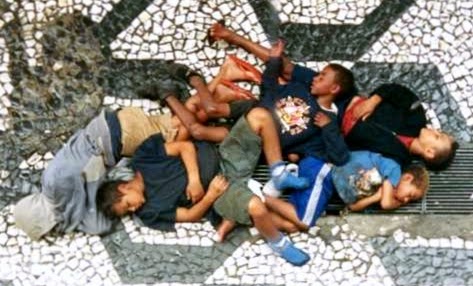>Exámenes selectividad inglés Cataluña resueltos
 «Is it true that in your country parents can be jailed for beating their children?», 16-year-old Jose asks us. Clearly there is no need to ask what made him run away from home to become one of Brazil’s «street children». Luckily for him, he lives in Porto Alegre, whose municipal council cares for them. Jose now sleeps in a council-run dormitory and spends most days in the city’s Open School, which allows street children to come and go as they please, trying to bring them back to a normal life and perhaps to an education.
«Is it true that in your country parents can be jailed for beating their children?», 16-year-old Jose asks us. Clearly there is no need to ask what made him run away from home to become one of Brazil’s «street children». Luckily for him, he lives in Porto Alegre, whose municipal council cares for them. Jose now sleeps in a council-run dormitory and spends most days in the city’s Open School, which allows street children to come and go as they please, trying to bring them back to a normal life and perhaps to an education.
It is a dark winter day when we visit the Open School. While the youngest ones play board games, the older ones kick a football around, tend the centre’s vegetable garden or learn the beginnings of skills that may make them employable one day. 13-year old Ismael recounts happily how he and his friends used to sleep behind a shopping centre, and laughs as he tells of the beatings they got from policemen who caught them sniffing glue.
Nearly all the Open School’s users still abuse some substance, often glue or a mixture of shop-lifted1 solvents2 and medication, a habit picked up on the streets to fight off hunger, cold and fear. These, the drug sniffers, are the easy ones to rescue, says one of the teachers: there are still groups of youngsters who are drug injectors but reject offers of help.
The clamour within Brazil over the situation had been growing since its return to democracy in the mid 1980s. Then, in July 1993, the whole world learnt about it, when eight children sleeping in a square in the centre of Rio were massacred by off-duty3 policemen.
Suddenly the world read of the packs of children living in the street, hunted down like rats by exterminators hired by angry shopkeepers. A recent independent study, however, discovered in Sao Paulo city, with its 10 million people, only 609 cases of really wild children.
Why are they there? Stela, from Sao Paulo’s University, says Brazil’s cities have had many street-dwellers since the big migrations from the countryside in the 1930s. But now a more modern factor is driving children on to the street: the fragmentation of families, especially the very poor.
Though family breakdown may be hard or impossible to prevent, something can be done to help its victims. The services Porto Alegre offers are modest: a shelter where the children can sleep, eat and wash; a day centre staffed with a few teachers, drug counsellors and so on; and some staff to patrol the streets at night looking for children in need. So why do other cities not do likewise?
A simple lack of public spending on public services, say some critics. However, it is often not money that is lacking but political will, competence, coordination and continuity. In Sao Paulo, for example, much of the city hall’s income in recent years has been skimmed off by corruption. But even the existing projects for the homeless are poorly coordinated and therefore inefficient. So people sleeping in one street may get fed twice in one night, while those in another street are entirely forgotten.
(From the press. Adapted)
1 lift: robar
2 solvent: dissolvent / disolvente3 off-duty: fora de servei / fuera de servicio
READING COMPREHENSION
Answer the following questions according to the information in the text Hope for the no-hopers.
1. Say two kinds of help that cities offer to the «street children».2. Say three problems that cities encounter when trying to help the street children.3. Problems do not afflict all the groups of street children in the same way. Say one difference.4. One of these three sentences is true. Which one?■ Porto Alegre is an exception in Brazil. Its city council really looks after the street children.
■ Political corruption is the biggest reason for the inefficiency of the help programs.
■ Children who have been living in the streets cannot be rescued.5. One of these three sentences is true. Which one?■ It wasn't until 1993, when the whole world learnt about the Rio massacres, that the big towns started to react.
■ Fragmentation of the families is a major reason for the existence of street children.
■ Attendance to an open school is compulsory for children once they have enroled in it.

No hay comentarios:
Publicar un comentario